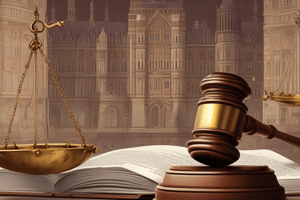Podcast
Questions and Answers
Which characteristic distinguishes an injunction from other legal remedies?
Which characteristic distinguishes an injunction from other legal remedies?
- It is a common law remedy focused solely on monetary compensation.
- It is an equitable remedy, granted when monetary damages are inadequate. (correct)
- It is a criminal sanction imposed by the state.
- It is a statutory remedy defined in legislation.
In which scenario would an injunction be most appropriately sought?
In which scenario would an injunction be most appropriately sought?
- To prevent a neighbor from continuously trespassing on private property. (correct)
- To seek punitive damages for a completed act of copyright infringement.
- To claim compensation for a past breach of contract.
- To claim compensation for a faulty product.
What is the key difference between a mandatory and a prohibitory injunction?
What is the key difference between a mandatory and a prohibitory injunction?
- A mandatory injunction prevents an act, while a prohibitory injunction compels an act.
- There is no substantive difference; the terms are interchangeable.
- A mandatory injunction compels an act, while a prohibitory injunction prevents an act. (correct)
- A mandatory injunction is temporary, while a prohibitory injunction is permanent.
What is the primary purpose of an interlocutory injunction?
What is the primary purpose of an interlocutory injunction?
In cases of alleged defamation, what additional burden does an applicant face when seeking an injunction to prevent publication?
In cases of alleged defamation, what additional burden does an applicant face when seeking an injunction to prevent publication?
Why are courts often hesitant to grant injunctions that restrain freedom of the press?
Why are courts often hesitant to grant injunctions that restrain freedom of the press?
Which of the following scenarios best illustrates the necessity of an injunction because damages would be an inadequate remedy?
Which of the following scenarios best illustrates the necessity of an injunction because damages would be an inadequate remedy?
In what way does the equitable nature of injunctions influence their availability as a remedy?
In what way does the equitable nature of injunctions influence their availability as a remedy?
Which act is most likely to be prevented by an injunction?
Which act is most likely to be prevented by an injunction?
Which case would most likely require an injunction?
Which case would most likely require an injunction?
What principle guides the court's decision when balancing freedom of the press against an individual's right to a good name in defamation cases?
What principle guides the court's decision when balancing freedom of the press against an individual's right to a good name in defamation cases?
Which of the following is NOT a typical use of an injunction?
Which of the following is NOT a typical use of an injunction?
What is the legal basis for the requirement that damages must be an inadequate remedy before an injunction can be granted?
What is the legal basis for the requirement that damages must be an inadequate remedy before an injunction can be granted?
In an employment dispute, why might a court grant an injunction to allow an employee to continue working?
In an employment dispute, why might a court grant an injunction to allow an employee to continue working?
How do courts typically approach requests for injunctions to prevent defamation?
How do courts typically approach requests for injunctions to prevent defamation?
Which of the following scenarios would most likely warrant a prohibitory injunction?
Which of the following scenarios would most likely warrant a prohibitory injunction?
What is the significance of establishing that damages are an 'inadequate remedy' when seeking an injunction?
What is the significance of establishing that damages are an 'inadequate remedy' when seeking an injunction?
How does an interlocutory injunction differ from a permanent injunction?
How does an interlocutory injunction differ from a permanent injunction?
What specific evidence might a party need to present to obtain an injunction against a potential act of defamation?
What specific evidence might a party need to present to obtain an injunction against a potential act of defamation?
In the context of injunctive relief, under which circumstance is the consideration of 'status quo' MOST relevant?
In the context of injunctive relief, under which circumstance is the consideration of 'status quo' MOST relevant?
Flashcards
What is an Injunction?
What is an Injunction?
A civil remedy used to prevent ongoing trespass, copyright infringement, defamation, breaches of contract, or unlawful picketing.
When is an Injunction sought?
When is an Injunction sought?
Damages must be an inadequate remedy.
What is a Mandatory Injunction?
What is a Mandatory Injunction?
An order for a party to perform a certain act.
What is a Prohibitory Injunction?
What is a Prohibitory Injunction?
Signup and view all the flashcards
What is an Interlocutory Injunction?
What is an Interlocutory Injunction?
Signup and view all the flashcards
Injunction in Defamation Cases
Injunction in Defamation Cases
Signup and view all the flashcards
Study Notes
- An injunction is a civil remedy, generally used to prevent ongoing trespass.
- Injunctions can allow an employee to continue employment while awaiting the outcome of a dispute.
- They can prevent infringement of copyright/trademarks, defamation, breaches of contract, and unlawful picketing.
- It is an equitable remedy, thus damages must be inadequate for a party to seek it.
- A mandatory injunction is a court order for a party to perform a certain act.
- A prohibitory injunction is a court order preventing a party from doing a certain act.
- Interlocutory injunctions maintain the status quo until a full hearing.
- Injunctions are often sought to stop a publication in cases of alleged defamation.
- Courts can be reluctant to grant injunctive relief where it would restrain the right of the freedom of the press.
- The court must deal with the competing rights of freedom of the press versus the right to protect the good name of the person alleging potential defamation.
- To succeed in an action for injunctive relief in defamation cases, the applicant must demonstrate they would succeed in proving defamation at trial and that the publication is defamatory.
- See Foley v Sunday Newspapers Limited IR 88 and Murray v Newsgroup Newspapers Limited and Ors IEHC 248.
Studying That Suits You
Use AI to generate personalized quizzes and flashcards to suit your learning preferences.




